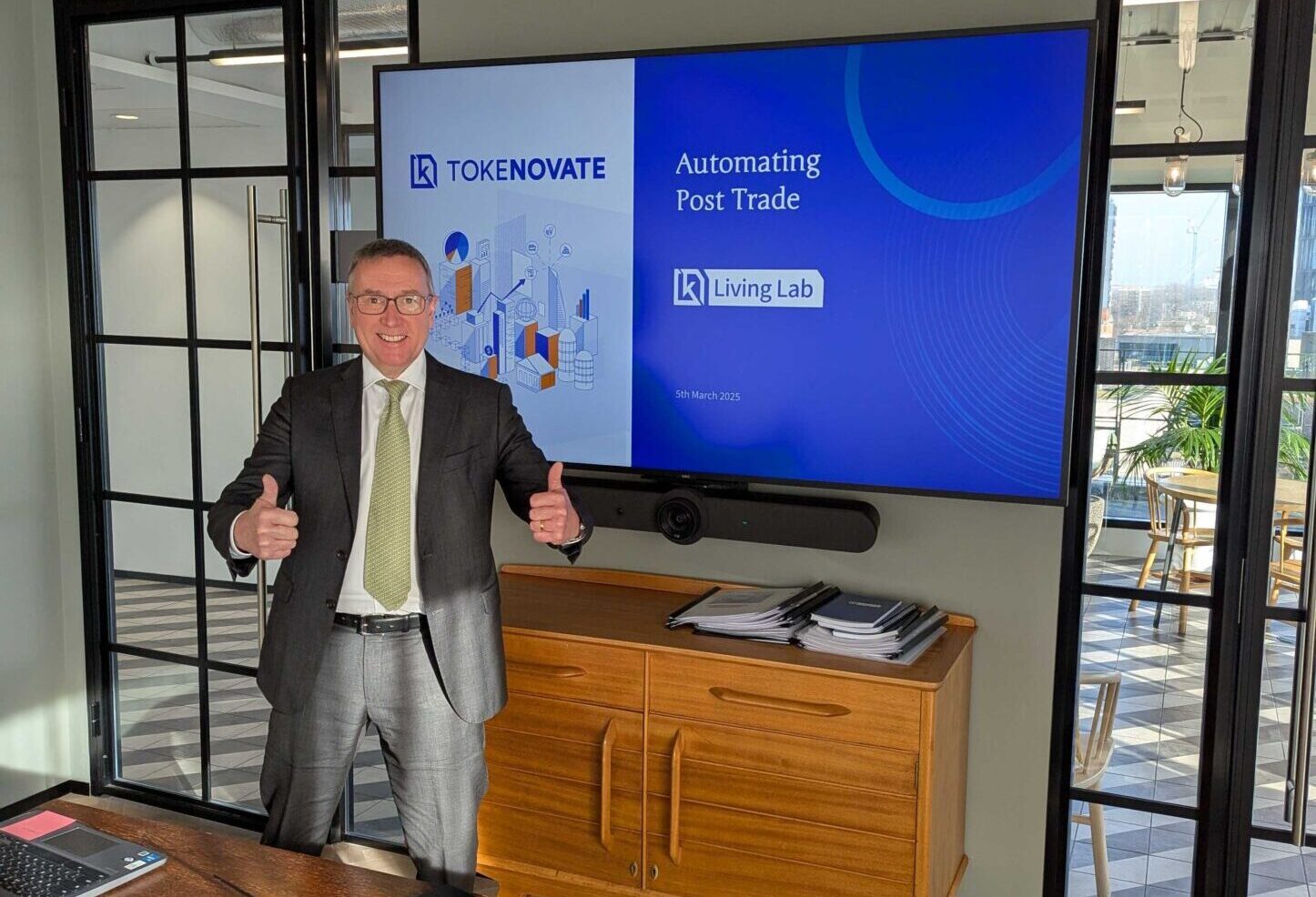On November 27, an important and thorough EU publication was released that examines the potential of public permissionless blockchains to enhance traditional financial services. Tokenovate sent a letter in response. In summary, we welcome this thoughtful and timely exploration of blockchain’s role in fostering efficiency, accessibility, and innovation in financial markets.
Our letter (published in full below) outlines Tokenovate’s high-level perspectives on key issues raised in the report, such as decentralisation, privacy, scalability, and settlement finality. We also highlight how our private, permissionless UTXO-based platform aligns with the report’s principles, offering scalable, secure, and legally enforceable solutions tailored to regulated financial environments.
4 December 2024
John Berrigan
Director General, DG-FISMA
European Commission
1049 Bruxelles/Brussel, Belgium
cc: Aurore Lalucq MEP
Chair of European Parliament Committee on Economic and Monetary Affairs
European Parliament
60, rue Wiertz / Wiertzstraat 60
1047 Bruxelles/Brussel, Belgium
By E-Mail
Subject: Enhancing Financial Services with Permissionless Blockchains
Dear Mr Berrigan,
We are writing on behalf of Tokenovate to commend the European Commission for its recent report, Enhancing Financial Services with Permissionless Blockchains (the Report). This paper offers a timely and insightful examination of how permissionless blockchain technology can enhance efficiency, accessibility, and automation in European and global financial markets.
Tokenovate is building a post-trade lifecycle management platform for financial products such as derivatives and securities financing transactions. Our system standardises trade data using the data and operational standards developed by the International Swaps and Derivatives Association (ISDA), the International Securities Lending Association (ISLA), and the International Capital Markets Association (ICMA), allowing us to automate trade processing and lifecycle management and support real-time tokenised settlement and collateral mobility.
Tokenovate’s platform incorporates many of the principles and recommendations set out in the Report, including on privacy and security, robust governance frameworks and scalability. Drawing on this practical experience, we would like to offer the following high-level perspectives on the Report:
1. Decentralisation and Governance
At Tokenovate, we believe permissionless blockchains are uniquely positioned to address key challenges in financial markets. By decentralising validation and embedding clear operational rules into the system, permissionless blockchains can foster trust among participants and reduce the risk of monopolistic behaviours often associated with private blockchain implementations.
We welcome the Report’s endorsement of permissionless blockchains as a foundational technology for fostering innovation, competition, and interoperability in financial markets. These systems offer a neutral and transparent infrastructure that supports the efficient processing of transactions and assets while reducing reliance on centralised intermediaries.
We fully agree with the Report’s efforts to dispel misconceptions about the role of node or miner numbers in maintaining decentralisation in permissionless systems. Emphasis should rightly shift to governance structures and validation processes that ensure power is distributed and resistant to capture by any single entity. As the Report highlights, even a large number of nodes can lead to centralisation if a small group holds disproportionate control over validation or decision-making, creating vulnerabilities to collusion and manipulation. Conversely, effective decentralisation can be achieved with a smaller, well-distributed network supported by governance mechanisms that promote diverse participation, accountability, and transparency, ensuring the system remains open, trustworthy, and resilient.
For example, and as the Report acknowledges, the economic incentives underpinning the consensus models inherent in Proof-of-Stake (PoS) systems can result in wealth concentration and governance capture by large stakeholders, perpetuating inequalities and undermining the neutrality of the system. Proof-of-Work (PoW) systems, particularly those leveraging UTXO-based architectures, can offer a more robust framework by tying governance to computational effort, reducing the risk of such economic centralisation.
2. Privacy
We fully support the Report’s emphasis on balancing privacy with transparency. In financial markets, transactions often involve confidential or market-sensitive data which must be protected to preserve investor privacy and market integrity. We fully agree that privacy-preserving mechanisms on public blockchains will be required to achieve this balance.
Tokenovate’s UTXO model offers inherent privacy advantages by isolating transaction outputs. Central to our design is the use of Coinbase Outputs, which are the original UTXOs generated when a new block is added to the blockchain. These UTXOs are considered “clean” because they are not linked to any prior transactions, making them an ideal foundation for creating unlinked (and therefore untraceable) UTXOs when privacy is required. This approach ensures privacy by design while allowing transaction traceability in accordance with the system’s permissioned architecture.
This architecture is supported by well-established cryptographic techniques, such as Merkle proofs, along with advanced methods like derived keys and hardware security modules (HSMs), to enable secure, scalable, and selective data disclosure while maintaining robust privacy and compliance controls. Merkle Trees – a cryptographic structure that organises data into a tree format – allow specific pieces of information to be proven or verified without revealing the entire dataset. In financial transactions, this ensures that entities, such as counterparties, authorised agents, or regulators, can access only the transaction data they are permitted to see, while data relating to other transactions remains confidential. This functionality mirrors solutions highlighted in the Report, such as zk-SNARKs (zero-knowledge proofs), which similarly enable one party to prove a claim without revealing additional information.
3. Blockchain as Provenance Layer
The paper rightly highlights permissionless blockchains’ potential as a neutral, base layer underpinning financial services. In Tokenovate’s approach, the blockchain acts as a provenance layer, ensuring data integrity and asset traceability while avoiding the systemic risks and monolithic structures that can arise when operational complexity is embedded directly within the blockchain or smart contract. Abstracting transactional and regulatory complexity away from the blockchain is vital in financial services, where systemic risks can arise from rigid, overly centralised architectures. Embedding such complexity at the base layer or Layer 2 implementations risks creating single points of failure, execution bottlenecks, and scalability constraints.
By treating the blockchain as a ledger of truth rather than an execution environment for conditional logic, we mitigate many of the operational and regulatory challenges outlined in the paper. Tokenovate’s approach aligns with ISDA’s work on smart derivatives contracts, emphasising flexibility, modularity, and legal certainty. Tokenovate’s Chief Legal and Product Officer, the principal author of ISDA’s foundational papers on this subject, has ensured our design supports higher-layer systems for managing conditional logic and events, enabling complex domain-specific adaptations, such as derivatives, to be delivered in a composable manner without overburdening the blockchain.
4. Scalability
The Report’s emphasis on handling large transaction volumes while preserving decentralisation is crucial for financial services, where the post-trade lifecycle of a single financial product can generate hundreds of on-chain transactions. These include observations, calculations, event processing, and collateral maintenance, all of which require high throughput, low latency, and energy efficiency to ensure viability.
After evaluating various private and public blockchain architectures, we recognise that trade-offs are inevitable among features and characteristics. It is clear, however, that certain types of blockchain are better placed to meet these challenges. For example, the UTXO-based blockchain used by Tokenovate has an unbounded block size and highly efficient and distributed consensus model, making it capable of processing hundreds of thousands of transactions per second, with each transaction costing fractions of a cent and consuming less than 1% of the energy expended by comparable blockchains. These capabilities make it ideally suited for financial market applications.
5. Settlement and Finality
We welcome the Report’s thoughtful exploration of settlement and finality. These issues are of critical importance to the safe and effective functioning of financial market infrastructures.
The Report’s nuanced discussion of finality, distinguishing between probabilistic, economic, and legal finality of settlement, underscores the value of balancing speed, decentralisation, and legal enforceability. We believe these topics must be considered holistically. This includes a review of the EU regulatory framework, such as the Financial Collateral Directive and the Settlement Finality Directive, to ensure they are adapted to accommodate the novel attributes of blockchain technology.
We firmly believe that abstraction of complexity from the core operational functioning of the blockchain (discussed in Section 3 above) is essential for supporting legal enforceability in financial markets. By keeping regulatory rules and operational complexity at higher layers, settlement, finality, and dispute resolution rules can be tailored to specific jurisdictions without modifying the blockchain protocol. This approach can also facilitate dispute resolution by enabling higher-layer systems to enforce legal rulings while relying on the blockchain’s immutable data.
Tokenovate’s approach has been shaped by careful consideration of these critical issues. Our PoW consensus model delivers real-time double-spend checks, robust cryptographic validation, and large-block scalability, striking a balance between probabilistic and legal finality to enable secure and efficient settlements. This architecture inherently supports atomic settlement, ensuring that all transaction steps are executed simultaneously or not at all – a feature essential for delivery-versus-payment (DvP) workflows and other high-value transactions, reducing settlement risk and enhancing operational efficiency.
The European Commission’s leadership in promoting blockchain innovation is critical as we navigate this transformative period for financial markets. At Tokenovate, we are committed to contributing to this dialogue and demonstrating how private, permissionless UTXO-based chains can provide scalable, interoperable and secure solutions tailored for regulated financial environments.
We would welcome the opportunity to meet with your team to discuss how our approach aligns with the principles outlined in the report and to explore areas of collaboration.
Thank you for your commitment to promoting and fostering innovation in financial services. We look forward to supporting your efforts to build a more inclusive, efficient and digital financial ecosystem.
Yours Sincerely,
Richard Baker
Founder & CEO
Tokenovate
Ciarán McGonagle
Chief Legal & Product Officer
Tokenovate
Image by Freepik. Designed by rawpixel.com


